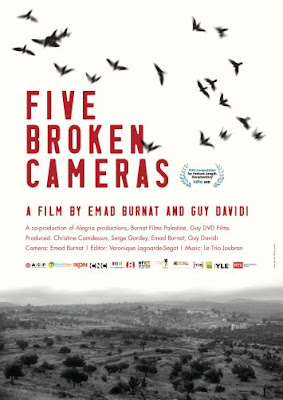„Five Broken Cameras” tells a story of a non- violent protest of the Palestinian inhabitants of Bil’in (north of Jerusalem) against the erection of the Israeli separation barrier. The barrier is designed in a way that goes through their land and confiscates it. For those familiar with the occupation realities, this will not be a new story. What is fresh and telling is that the story unfolds through the lens of Emad Burnat, a Palestinian farmer. Burnat first buys his camera to capture the birth his fourth son Jibril. Soon his personal filming becomes a deeply personal account of how the politics of the occupation enters and transforms the everyday life his family and people in the quiet village of Bil’in. From the amateur looking shots of a newborn baby the camera takes us to the Friday demonstrations when the peaceful protest of the villagers and the Israeli activists is met with the molotov cocktails, tear gas and rubber bullets of the IDF soldiers and, occasionally, settlers violence. Until the device gets shot. So Emad buys a new camera ...
Five broken cameras later Jibril, Emads youngest son is already 4 yo. By that time his eyes have witnessed the the settlers burning their olive trees, the wall being built surrounding the village’s land, the nearby settlements have been erected. He had seem the soldiers entering his house in the middle of the night, his father's arrest and ....his favourites uncle’s Phil death. Phil, the village superhero, was mortally shot in one of the protests. Emad’s camera captures it with the cold blood. So do Jibril’s eyes.
Is he still a a child when he kisses a poster of dead Phil hanging on a wall in front of his house? I don’t know.
The film ends with what might look like a villagers’ huge success. After few years of struggle the thy finally received a court order to change the route of the wall. And than, after another few years of protests they actually saw Israelis executing the the court decision and moving the fence by few meters. After so many years of struggle and so many broken or wasted lives the success that finally arrives has a bitter - sweet taste. Certainly, the villagers of do Bil’in celebrate. Success like this one does not happen very often. But the reality is that the victory comes way to late too be really appreciated. It comes too late to allow things to go back „to normal”.
Guy Dadivi, the Israeli co - director of the film said that he thought that the filming was a healing process. Yes, in a way I can see how sharing this testimony can be a way of coping with the trauma that both Emad and Guy experienced documenting the events.
At the same time I cannot stop thinking that „5 Broken Cameras” is a metaphor of what is going on in thousand of West Bank Bil’ins. In this sense I cannot stop thinking that it it like an open wound that cannot really be healed. After the screening I went to, the post - film discussion I took part in was about the choice between violent or non - violent resistance that Palestinians face. The reality is that, having lived there for a while, I do not really believe that Palestinians have any choice right now at the moment. And surely the choice is not between an armed struggle and the peaceful resistance. Where the film is really shocking and why I say it leaves me broken, is where it shows the mechanism of a complete disillusion and the mechanism of powerlessness. The wall might have been moved by 10 meters in Bili’in, yet the price that has to be paid at the end of the day was way too high. Meanwhile, the hundreds of kilometres of new wall have been built elsewhere....
Therefore, at the end of the day, for me, the film is about endless exhaustion and senseless waste of lives in the West Bank. It’s about the the only real struggle that is going on in Palestine right now .... a struggle to survive.
PS. As one of my friends acknowledged (thanks Bartek) the film was also interesting portrait of Israeli soldiers and the deeds of the army that was supposed to be „the good army” according to Israel’s founding myth. Five Broken Cameras displays the army practices in the West Bank in its full brutality and no matter how hard you try it is really difficult to justify them as the „defence” actions. While for anyone who ever came to Palestine these practices including overusing force, arresting kids, failure to protect Palestinians harassed by armed settlers, will be no novelty, the film indeed leaves open the problem of complicity of the generations of young Israelis who are put in the situation where they easily revert to violence and they use it easily ...
I don’t know, this might as well leave them broken sometimes. And it does.. see Breaking the Silence: http://www.breakingthesilence.org.il/

This is truely honest film, it comes back to what film used to be and art of capturing the moments as they are. After it you have no doubt that you have faced truth. Even if this is difficult one.
ReplyDeleteon my "to-see" list now, thanks
ReplyDelete